Real Estate Meets AI—Welcome to the Future of Property Deals
Written by: Clyde Christian Anderson
Why AI-Powered Real Estate Is Changing Property Markets
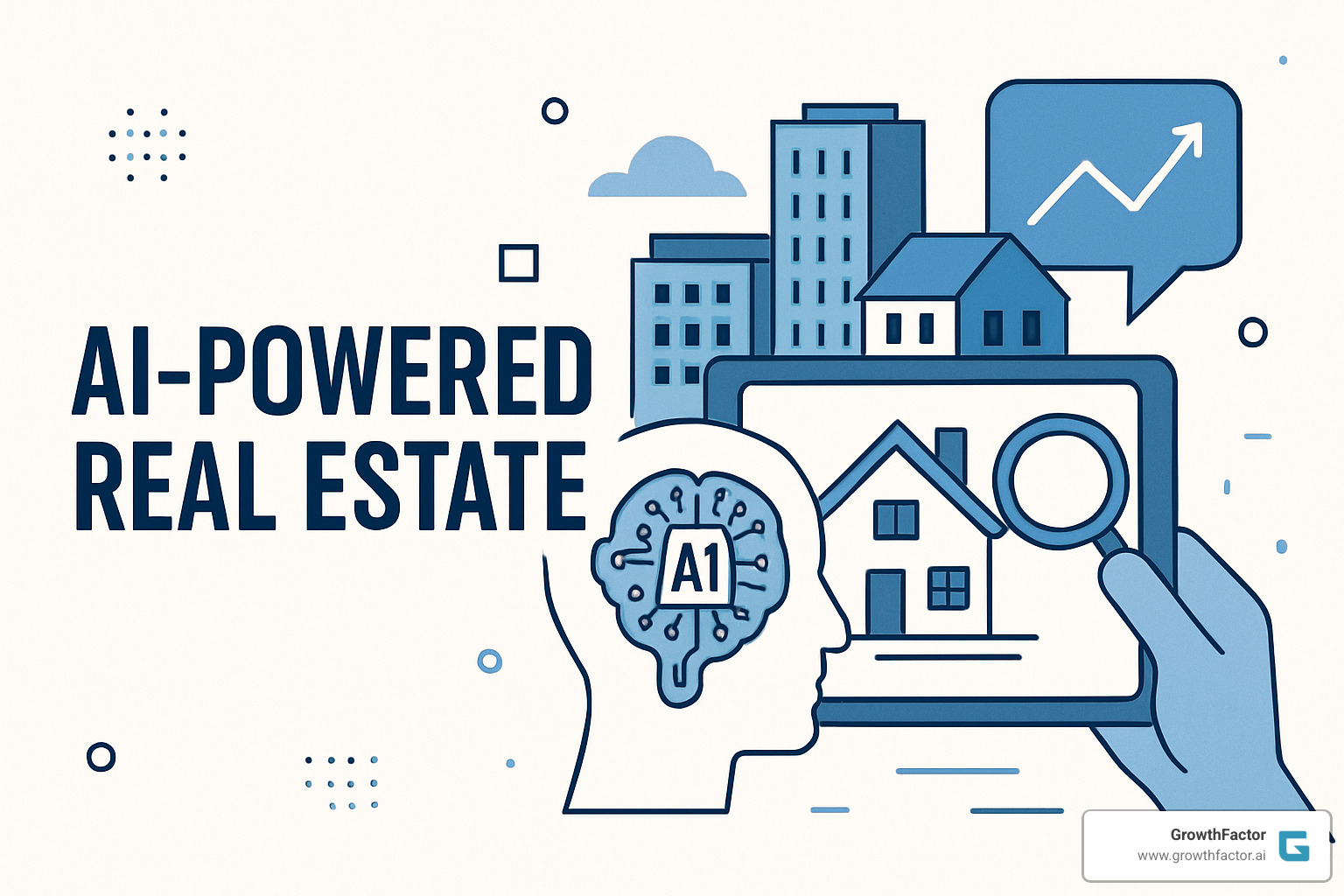
AI powered real estate is revolutionizing how we buy, sell, manage, and invest in properties through artificial intelligence technologies that automate processes, predict market trends, and improve decision-making across the entire property lifecycle.
Key AI Applications in Real Estate:- Property Valuation: Automated models with 2.4% median error rates- Lead Generation: AI chatbots with 48% response rates handling 25M+ conversations- Site Selection: Predictive analytics identifying 72% of future listings- Property Management: 24/7 virtual assistants and automated tenant screening- Market Analysis: Real-time insights from millions of data points- Virtual Staging: AI-generated room designs and 3D tours
Generative AI could open up $110 billion to $180 billion in value for the real estate industry, while AI-powered PropTech investment reached $630 million in 2023 alone. Companies using AI report over 10% gains in net operating income through smarter operations and better asset selection.
This represents a fundamental shift from manual, paper-based processes to intelligent, data-driven decision-making. Real estate professionals who once spent weeks evaluating properties can now analyze hundreds of sites in hours. Property managers handle tenant inquiries 24/7 through AI assistants. Investors make faster, more accurate decisions with predictive analytics.
The AI revolution is particularly powerful for retail expansion and commercial real estate. Traditional site selection involved months of manual research and gut-feel decisions. Today's AI systems can evaluate market potential, analyze demographics, predict foot traffic, and generate comprehensive site reports in minutes.
I'm Clyde Christian Anderson, CEO of GrowthFactor.ai, where we've helped retailers evaluate 800+ locations in 72 hours during major bankruptcy auctions, opening up $1.6M in cash flow through AI powered real estate solutions. My background spans investment banking at Wells Fargo, private equity at BDT & MSD, and hands-on retail operations.
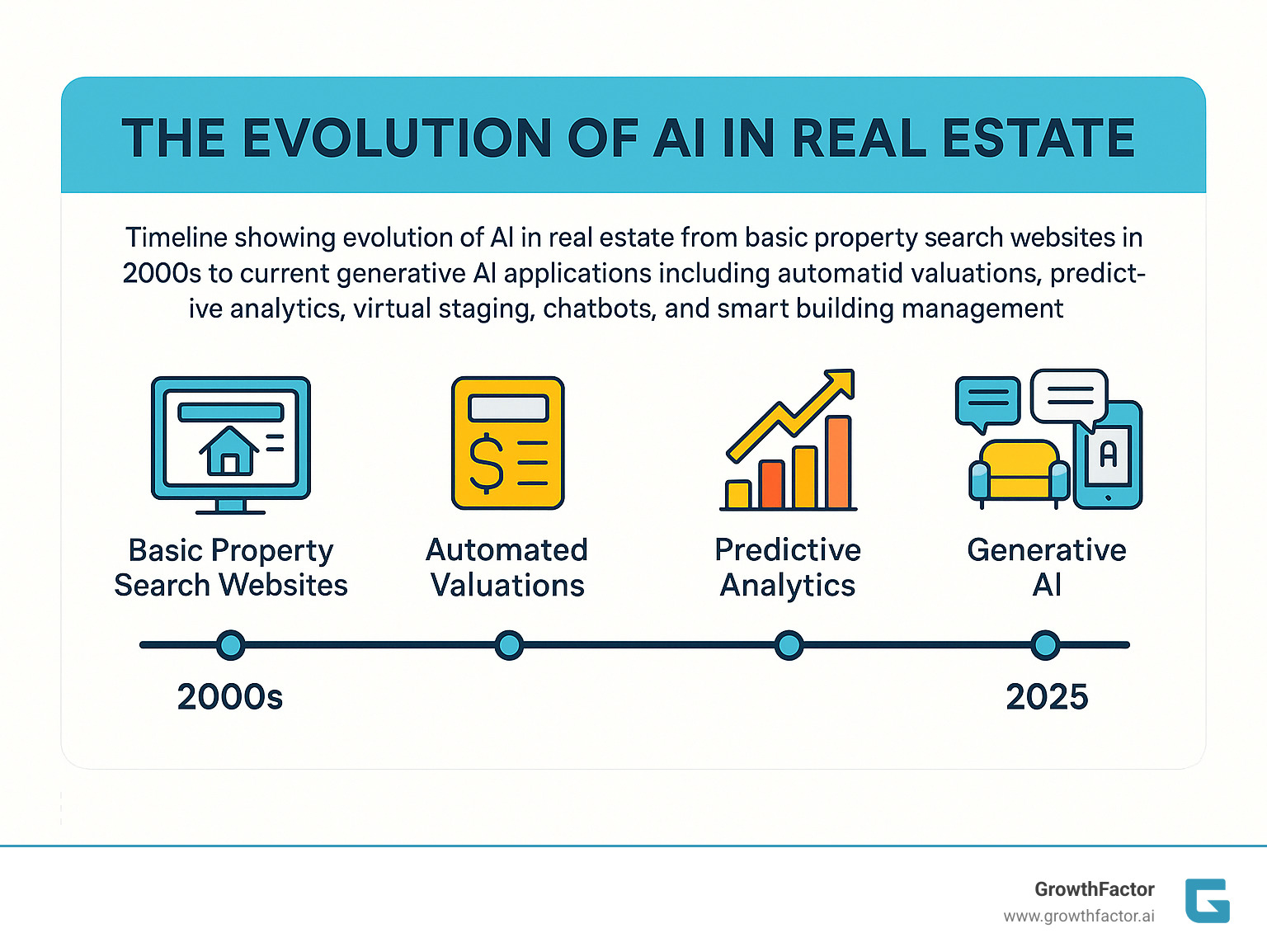
What Is AI-Powered Real Estate?
AI powered real estate brings artificial intelligence into every corner of property transactions, management, and investment decisions. While a traditional analyst might evaluate 10-15 properties in a week, AI systems can simultaneously process thousands of properties, analyzing market trends, demographic shifts, traffic patterns, and financial projections instantly.
The magic happens through several core technologies working together. Machine learning digs through millions of historical transactions to spot patterns that even seasoned professionals might miss. Generative AI takes care of the creative heavy lifting—writing compelling property descriptions, crafting personalized marketing materials, and generating architectural designs.
Computer vision acts like a super-powered property inspector, analyzing photos, satellite imagery, and drone footage to assess conditions and estimate square footage. Natural language processing powers chatbots that handle tenant questions at 2 AM and analyze lease documents faster than any legal team.
The PropTech foundation laid the groundwork by digitizing listings. Now we're seeing truly smart buildings emerge—properties that use IoT sensors and AI to automatically optimize energy usage, predict maintenance needs, and create better experiences for everyone inside.
More info about AI for Real Estate
How AI-Powered Real Estate Differs from the Old Playbook
The traditional approach meant driving around neighborhoods with clipboards, manually gathering demographic data, and making decisions based largely on experience and gut feelings. A single site evaluation could stretch over weeks.
AI powered real estate flips this entire process. Instead of manual research expeditions, intelligent algorithms instantly analyze thousands of data points—foot traffic patterns, competitor locations, demographic trends, and historical performance metrics. What used to take weeks now happens in minutes.
Property management has shifted from reactive approaches—waiting for things to break, manually screening tenants—to predictive systems that spot maintenance issues before they become problems and provide 24/7 support through intelligent assistants.
Core Technologies Behind the Shift
Large Language Models like GPT-4 create engaging property descriptions, analyze complex lease documents, and power conversational AI assistants. Deep learning algorithms excel at recognizing patterns in massive datasets, making them ideal for property valuation and market prediction.
Predictive analytics uses historical data to forecast future trends—identifying which homeowners are likely to sell before they know it themselves. Computer vision has transformed property assessment, analyzing photos to estimate square footage and identify renovation needs.
IoT sensors in smart buildings generate continuous data streams about occupancy patterns and energy usage, which AI systems process to optimize building operations.
Data Is the New Location
In the AI era, "location, location, location" has become "data, data, data." Modern AI powered real estate platforms pull together information from dozens of sources—public records, MLS systems, demographic databases, satellite imagery, and IoT sensors.
Data quality remains a significant challenge, costing the U.S. economy around $3.1 trillion annually. In real estate, this means ensuring property records are accurate and different data sources integrate properly.
| Data Type | Public Sources | Proprietary Sources | AI Applications |
|---|---|---|---|
| Property Records | County assessors, MLS | Internal transaction history | Valuation, market analysis |
| Demographics | Census, BLS | Customer databases | Site selection, marketing |
| Market Trends | Public sales data | Portfolio performance | Investment decisions |
| Building Performance | Energy usage reports | IoT sensor data | Operations optimization |
Scientific research on poor data quality
Where AI Creates Value Across the Property Lifecycle
AI powered real estate creates value at every stage of the property lifecycle, from initial site selection through ongoing management and disposition. The technology's impact spans residential, commercial, investment, property management, and development.
The change is particularly pronounced in commercial real estate, where complex decisions involving multiple stakeholders benefit enormously from AI-driven insights. At GrowthFactor, our AI Agent Waldo helps teams evaluate five times more sites efficiently while automating qualification processes.
Lead Generation & Marketing Magic
AI has revolutionized how real estate professionals identify and engage potential clients. Predictive analytics can identify homeowners likely to sell in the next 6-12 months with 72% accuracy, allowing agents to focus on high-probability prospects.
AI-powered chatbots handle initial engagement with impressive results. Ylopo AI Text has facilitated over 25 million conversations with a 48% response rate. These systems qualify leads, schedule appointments, and provide property information 24/7.
Virtual staging represents another breakthrough. AI can generate multiple furnished room designs from a single empty room photo in seconds, helping buyers visualize potential without expensive traditional staging.
More info about AI Property Management Tools
Smarter Valuations and Investments
Property valuation has been transformed by Automated Valuation Models (AVMs) that achieve remarkable accuracy. Zillow's AI-powered Zestimate predicts property values with a national median error rate of just 2.4%, processing data from over 153 million property parcels.
These systems consider hundreds of variables—from local school ratings and crime statistics to infrastructure investments and zoning changes. They update valuations in real-time as new data becomes available.
Portfolio optimization represents another significant advancement. AI algorithms analyze entire real estate portfolios to identify underperforming assets and recommend optimal allocation strategies. Companies using these systems report over 10% gains in net operating income.
Scientific research on valuation AI
Operations & Tenant Experience
Property management has been revolutionized by AI-powered systems that handle everything from tenant screening to maintenance requests. These systems process rental applications in minutes, analyzing credit scores, employment history, and rental references.
Maintenance bots powered by AI can predict equipment failures before they occur. One case study showed AI-powered HVAC optimization achieving a 708% ROI with 59% energy savings.
Tenant communication has been transformed by AI chatbots that handle routine inquiries and maintenance requests 24/7. EliseAI and similar platforms provide instant responses through multiple channels—text, email, and voice calls.
More info about AI in Property Management
Design, Build & Retrofit Revolution
Construction and development have been transformed by generative design tools that create and evaluate thousands of design options in minutes, optimizing for cost, energy efficiency, and structural integrity simultaneously.
Site selection for new developments now leverages AI analysis of demographic trends, traffic patterns, and environmental factors. Drone inspection powered by computer vision can assess property conditions and monitor construction progress automatically.
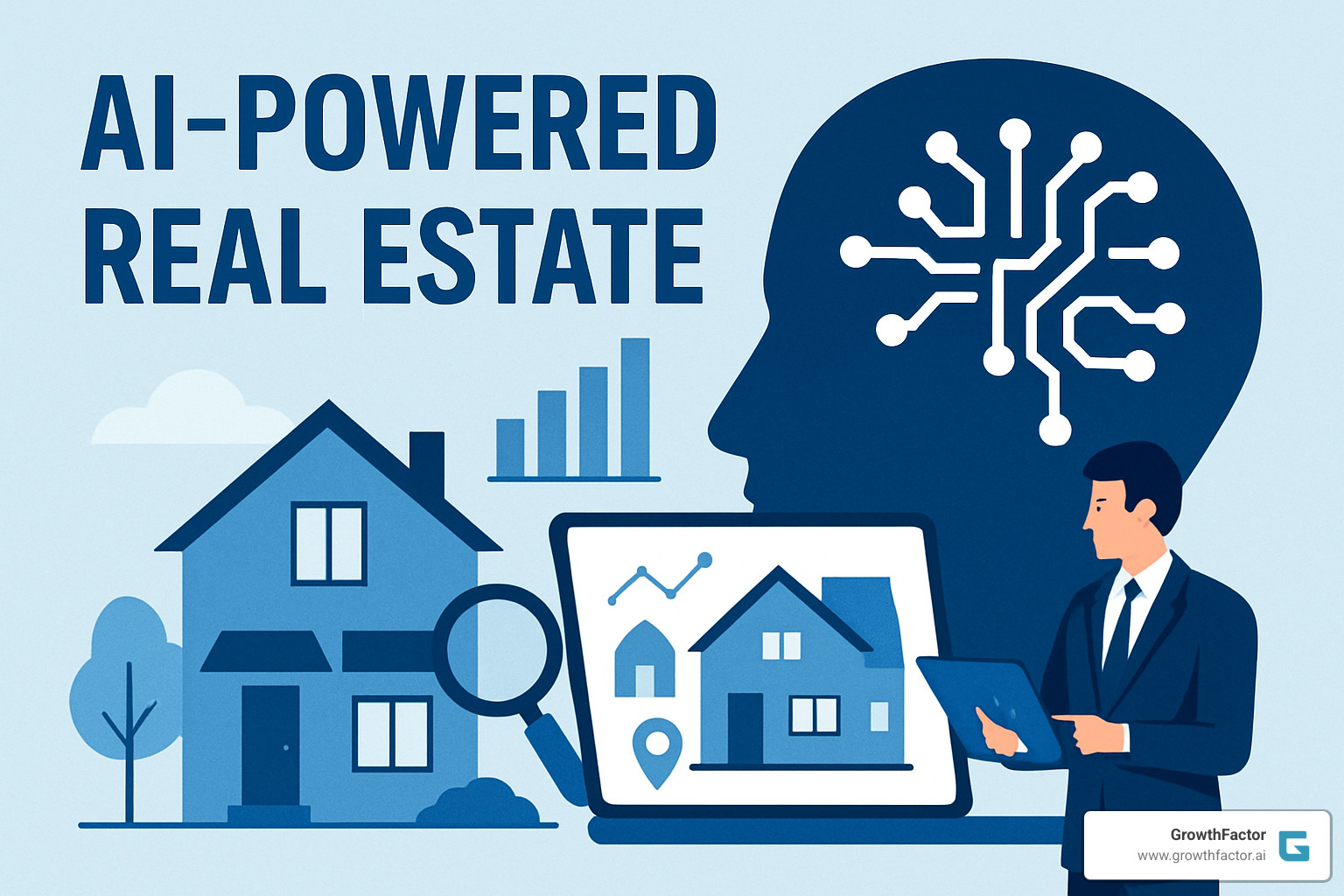
Real-World Success Stories and Case Studies
The impact of AI powered real estate is best understood through real-world examples that demonstrate tangible benefits across different market segments. The real estate footprint of AI companies in the U.S. reached 1.9 million square meters by the end of 2023, doubling since 2020.
Residential Market Wins
Zillow's Zestimate represents one of the most visible AI success stories in residential real estate. By analyzing millions of property records and market trends, the system provides instant property valuations with a national median error rate of 2.4%.
Personalized property search has transformed the home-buying experience. AI algorithms analyze buyer preferences and behavioral data to recommend properties that match individual needs, often predicting user preferences more accurately than buyers themselves.
Virtual tours powered by AI have become essential, creating immersive 3D experiences from standard photos. Some platforms can generate virtual staging and renovation visualizations, helping buyers envision a space's potential.
Commercial & Retail Edge (incl. GrowthFactor)
Commercial real estate has seen dramatic improvements in site selection capabilities. At GrowthFactor, our AI Agent Waldo enables teams to evaluate five times more sites efficiently while automating qualification processes. This capability proved invaluable during major bankruptcy auctions, where we helped retailers evaluate 800+ locations in 72 hours, ultimately opening up $1.6M in cash flow.
Lease analysis has been revolutionized by AI systems that parse complex commercial leases, extract key terms, and identify potential issues. These systems process hundreds of pages of legal documents in minutes.
Market analysis for commercial properties now incorporates real-time data from multiple sources—foot traffic patterns, competitor analysis, demographic trends, and economic indicators.
Property Management Efficiency
Property management companies report significant efficiency gains from AI adoption. Automated tenant screening processes applications in minutes rather than days, analyzing credit scores, employment history, and rental references simultaneously.
Chatbots handling tenant inquiries have achieved impressive results. Some systems report 40% higher occupancy rates and improved tenant satisfaction scores. These AI assistants handle routine requests, schedule maintenance, and process rent payments.
Predictive maintenance represents one of the most compelling AI applications. By analyzing equipment performance data and usage patterns, AI systems can predict failures before they occur, reducing emergency repairs and extending equipment life.
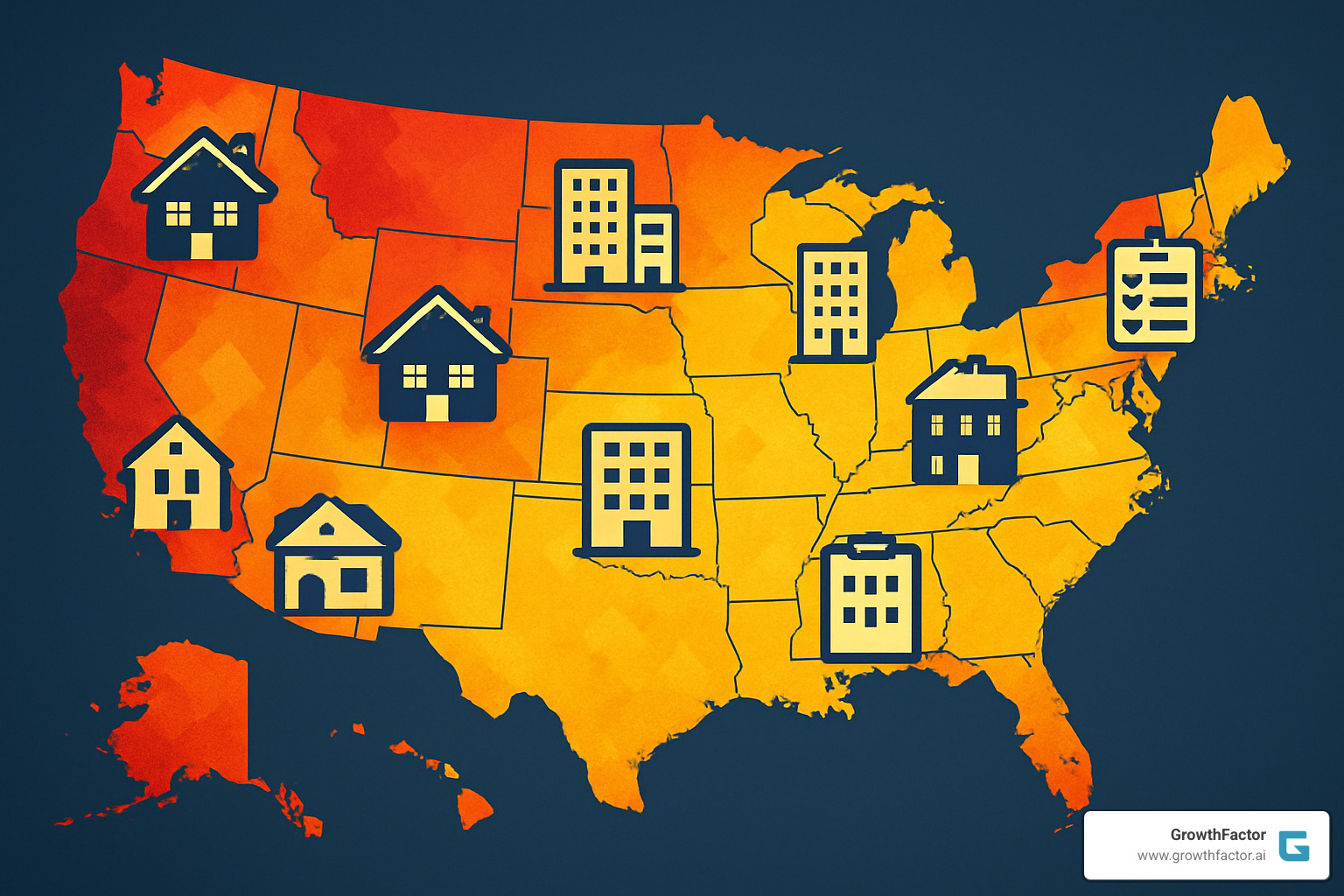
Risks, Ethics & Regulation in AI-Powered Real Estate
While AI powered real estate offers tremendous benefits, it also introduces new risks and ethical considerations. Privacy concerns, algorithmic bias, fair housing compliance, and the potential for deepfakes require proactive attention from industry professionals.
More than nine in ten C-suite leaders believe AI will change how the workforce operates over the next five years, making it essential to address these challenges proactively.
Artificial Intelligence: Real Estate Revolution or Evolution?
Data Privacy and Security
Real estate AI systems process vast amounts of sensitive personal and financial information. GDPR and similar regulations require explicit consent for data processing and give individuals rights to access, correct, and delete their personal information.
Data anonymization presents technical challenges in real estate, where property addresses are often essential for AI algorithms to function effectively. Companies must balance detailed data needs with privacy protection requirements.
Security breaches in real estate can expose highly sensitive information about property values, personal finances, and living situations. Robust cybersecurity measures, including encryption, access controls, and regular security audits, are essential.
Algorithmic Bias & Fair Housing
AI systems can perpetuate or amplify existing biases in real estate markets, potentially violating fair housing laws. Training data that reflects historical discrimination can lead AI systems to make biased decisions about property values, loan approvals, or tenant screening.
Transparency in AI decision-making is crucial for fair housing compliance. Real estate professionals must be able to explain how AI systems reach conclusions and demonstrate that decisions are based on legitimate factors rather than protected characteristics.
Regular monitoring and testing of AI systems can help identify bias that emerges over time, including analyzing outcomes across different demographic groups.
Legal Landmines and Compliance
The legal landscape for AI in real estate is complex and evolving. Copyright issues arise when AI systems generate content based on existing materials. Deepfake technology raises concerns about fraudulent property listings or misrepresentation of property conditions.
Lease clauses and contract terms generated by AI must be carefully reviewed to ensure compliance with local laws. While AI can draft initial versions quickly, human legal review remains essential.
Liability questions arise when AI systems make errors or provide incorrect information. Clear policies must establish responsibility for AI-generated content and decisions.
More info about AI Lease Management

Getting Started: Strategic Adoption Roadmap
Successfully implementing AI powered real estate solutions requires a strategic approach that aligns technology capabilities with business objectives. The key is starting with clear goals, building proper foundations, and scaling gradually based on measurable results.
C-suite alignment is crucial for AI adoption success. Leaders must understand both the potential benefits and the investment required, including technology costs, training, and change management efforts.
The most successful AI implementations begin with pilot projects that demonstrate clear value. These should focus on specific use cases where AI can deliver measurable improvements—such as lead qualification, property valuation, or tenant screening.
Infrastructure & Data Foundations
Modern AI applications require robust technical infrastructure that can handle large volumes of data and complex processing requirements. Cloud-based data lakehouses provide the flexibility and scalability needed for AI workloads.
API-first architectures enable seamless integration between AI tools and existing real estate systems. This interoperability is crucial for creating unified workflows that span multiple platforms and data sources.
Data quality management becomes even more critical in AI applications. Poor data quality can lead to inaccurate predictions and unreliable insights. Investing in data cleaning, standardization, and governance processes pays dividends in AI effectiveness.
Building the AI-Ready Team
Successful AI adoption requires new skills and roles within real estate organizations. Prompt engineers who can effectively communicate with AI systems become crucial for maximizing the value of generative AI tools.
Upskilling existing staff is often more effective than hiring entirely new teams. Real estate professionals who understand the business context can learn to work effectively with AI tools, combining domain expertise with technological capabilities.
A co-pilot culture treats AI as an augmentation tool rather than a replacement for human expertise. This approach maximizes the benefits of both human judgment and AI capabilities.
Measuring ROI and Scaling Wins
Measuring the return on investment from AI initiatives requires clear metrics and baseline measurements. Key performance indicators should align with business objectives:
- Time Savings: Hours saved through automated processes
- Revenue Impact: Increased deal volume, faster closings, higher occupancy rates
- Cost Reduction: Lower operational costs, reduced manual labor
- Quality Improvements: More accurate valuations, better tenant screening
- Customer Satisfaction: Higher Net Promoter Scores, reduced response times
NOI uplift represents one of the most important metrics for property owners and managers. AI-driven improvements in operations, tenant retention, and asset selection can deliver measurable increases in net operating income.
Scaling successful AI initiatives requires systematic approaches to expanding pilot projects across larger portfolios or additional use cases.
Frequently Asked Questions about AI-Powered Real Estate
Will AI replace real estate agents?
While AI tools can perform many tasks traditionally handled by real estate agents—like property valuations, lead generation, and initial client communication—human agents remain essential for complex negotiations, relationship building, and providing personalized advice.
AI is better viewed as a powerful augmentation tool that enables agents to be more effective and efficient. Agents using AI can handle more clients, provide faster responses, and offer more detailed market analysis. The most successful agents will be those who learn to leverage AI capabilities while maintaining the human touch that clients value.
The real estate transaction process involves significant emotional and financial decisions that benefit from human expertise and empathy. While AI can provide data and automate routine tasks, the judgment, negotiation skills, and relationship management that agents provide remain irreplaceable.
What data do I need for AI-powered real estate projects?
Successful AI implementations require high-quality, comprehensive data across multiple categories:
Property Data: Detailed records of property characteristics, transaction history, and current market conditions form the foundation of most real estate AI applications.
Market Data: Demographic information, economic indicators, and market trends provide context for property valuations and investment decisions.
Operational Data: For property management applications, data about tenant interactions, maintenance requests, and building performance enables AI to optimize operations.
Customer Data: Understanding client preferences, search patterns, and communication history enables personalized service and more effective marketing.
The key is ensuring data quality through proper cleaning, standardization, and governance processes. Poor data quality can undermine AI effectiveness and lead to unreliable results.
How much budget should I plan for AI adoption?
AI adoption costs vary significantly based on the scope of implementation and specific use cases. At GrowthFactor, we offer three pricing tiers to accommodate different needs and budgets:
- Core Plan ($500): Basic AI-powered site selection and evaluation tools
- Growth Plan ($1,500): Advanced analytics and expanded feature set
- Enterprise Plans: Custom solutions for large-scale implementations
Beyond software costs, organizations should budget for:
Training and Change Management: Staff need time to learn new tools and adapt workflowsData Infrastructure: Upgrading systems to support AI applicationsIntegration Costs: Connecting AI tools with existing platforms and databasesOngoing Optimization: Continuous improvement and system maintenance
The ROI from AI adoption typically justifies the investment through time savings, improved decision-making, and increased revenue. Many organizations see payback within 6-12 months of implementation.
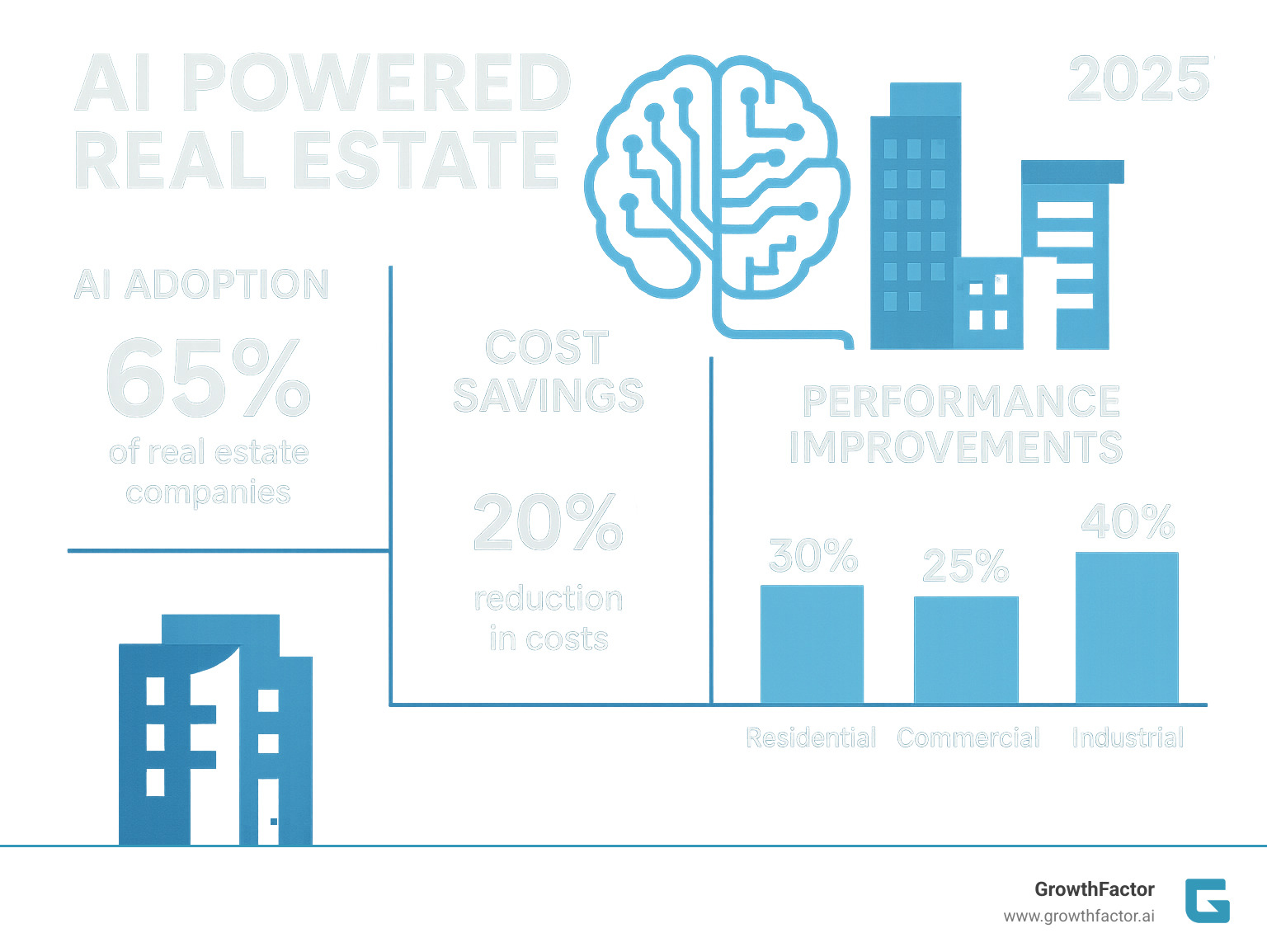
Conclusion
The future of real estate is already here, and it's powered by artificial intelligence. AI powered real estate isn't just another tech trend—it's fundamentally changing how we buy, sell, manage, and invest in properties. The numbers don't lie: $630 million in PropTech investment last year alone, and generative AI ready to open up $110-180 billion in industry value.
This change is happening right now. While you're reading this, AI systems are processing millions of property records, chatbots are converting leads at 48% response rates, and predictive models are identifying future listings with 72% accuracy. The question isn't whether AI will change real estate—it's whether you'll be leading that change or scrambling to catch up.
At GrowthFactor, we've witnessed this change firsthand. Our AI Agent Waldo has helped retail teams evaluate five times more sites efficiently, turning weeks of manual research into hours of intelligent analysis. When major bankruptcy auctions demanded evaluating 800+ locations in just 72 hours, AI made the impossible possible, ultimately opening up $1.6M in cash flow for our clients.
This AI revolution isn't about replacing human expertise—it's about amplifying it. The best real estate professionals aren't being replaced by AI; they're becoming superhuman by partnering with it. They're serving more clients, making better decisions, and delivering results that would have been impossible just a few years ago.
The competitive advantage is real and measurable. Companies using AI report over 10% gains in net operating income. Property managers achieve 40% higher occupancy rates. Energy optimization delivers 59% savings with 708% ROI. These aren't theoretical benefits—they're happening in real buildings with real tenants right now.
The organizations that will thrive in the next decade are those that accept AI powered real estate as an essential capability, not an optional upgrade. They're building AI-ready teams, investing in quality data, and implementing strategic roadmaps that combine technological power with human insight.
Whether you're managing a single property or overseeing thousands of locations, the opportunity is the same: harness AI to work smarter, serve better, and grow faster. The technology is mature, the benefits are proven, and the competitive advantages are significant.
The future of real estate is powered by AI. The only question left is: are you ready to power up?
Citations
The human algorithm
Request Your demo
Schedule meeting
Or submit your information below and we'll be in touch to schedule.


